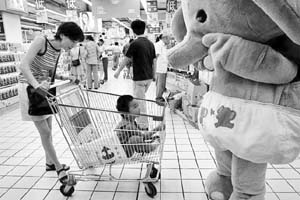Disposable income, disposable diapers?
- By Ember Swift
 0 Comment(s)
0 Comment(s) Print
Print E-mail China.org.cn, November 4, 2012
E-mail China.org.cn, November 4, 2012
China's boom in wealth and prosperity has generated a whole new reality for Chinese people: an era of waste. It's a catch-22 — the more you can afford to consume, the more likely you are to consume more than you really need, therefore generating copious amounts of waste.
There are still elderly people in China who remember having no food to eat in the late fifties and early sixties. Rather than this resulting in hyper-frugality, modern day banquets are often served to excess as though only through the substantial waste of food can a person prove his bounty. Long after guests have finished eating at an average Chinese wedding, for example, mountains of untouched food are often hauled away by wait staff.
We have seen this phenomenon in the West — especially in the 1980s, when the rise of North American convenience and luxury culture turned wastefulness into a way of life. Some ever-pervasive, persistent examples include disposable coffee cups, non-recyclable Styrofoam fast food containers, and last but not least, the infamous disposable diapers.

Invented in the forties and popularized in the late sixties, and made affordable by the late seventies, disposable diapers are one of the West's worst inventions in terms of environmental impact. The Environmental Protection Agency reports that approximately 20 billion disposable diapers find their way into landfills every year, accounting for 3.5 million tons of waste. In just the United States alone, 200,000 trees are lost each year to the disposable diaper manufacturing industry. Studies have proven that disposable diapers require 20 times more raw materials and three times more energy to make than cloth diapers.
China, on the other hand, has an age-old custom that has started to catch on in Western circles called: "elimination communication." This is the process by which babies are taught from an early age to relieve their bladders and bowels on cue through a repetitive sound such as whistling. A whole supporting fashion industry called 開襠褲 (kai dang ku) or "open crotch pants" exists for infants here, making potty training that much easier because parents don't have to remove the child's outer clothing every time nature calls. By the time the average Chinese child is walking, they purportedly know how to squat and go, avoiding the diaper industry altogether.
At least, that is how things used to be.
When I married into a Chinese family, set up home in Beijing and gave birth to our first child, you can imagine how excited I was to go the environmentally-friendly route of traditional Chinese potty training. I expected this decision to be supported by my Chinese in-laws and partner. Little did I know how much of a struggle it would be to fight for their tradition. Complete role reversal.
For Chinese consumers, disposable diapers and disposable incomes go hand-in-hand. As incomes rise, China is becoming one of the world's fastest growing disposable diaper markets. Diapers are still expensive here, compared to the local average wage, but purchasing them represents one's buying power and elevated status. They are thus considered a generous and extravagant gift for new parents.
I have even seen babies wearing disposable diapers and the open-crotched pants outdoors, an outrageous defilement of the traditional approach. Of course, the pants lose their intended function in this context, but it does allow everyone to see that the child's family can now afford a luxury that once symbolized Western affluence.
However, is this association even relevant anymore? In this day and age, I argue that disposable diapers more accurately symbolize shortsighted, first world decadence. Or, in short, a mistake — a Western idiocy that ought not to infect an already wise culture like China's.
Yet, when my own mother-in-law argued adamantly for the use of disposable diapers for my daughter, this rationale was far from her mind. Her generation suffered through the hardships of the Cultural Revolution; as such, she perhaps sees modern-day luxuries as necessary compensation. Besides, she said, they can afford it. In her mind, the immediacy of her grandchild's dry bottom (disposable diapers wick away moisture) far exceeds any sense of responsibility she feels towards a greener environment for our collective futures. After all, she already worked towards collective goals throughout her youth; now is the time for some selfish conveniences.
But, if the promise of a cleaner future for the next generation—her grandchild—cannot convince her to use reusable diapers or to employ the age-old Chinese method of early potty training, not wishing to repeat "stupid Western" mistakes certainly should. The increased prevalence of disposable diapers in the Chinese market is one way that Western mimicry creates a mockery out of otherwise intelligent Chinese.
The author is a columnist with China.org.cn. For more information please visit: http://www.ccgp-fushun.com/opinion/emberswift.htm
Opinion articles reflect the views of their authors, not necessarily those of China.org.cn.





